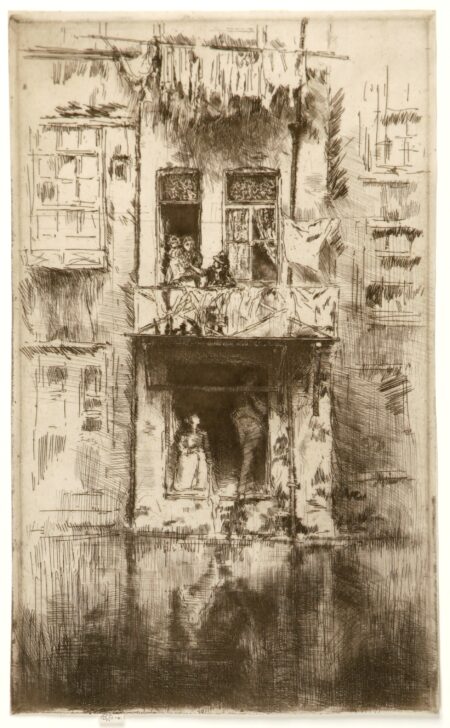Balcony, Amsterdam
James Abbott McNeill Whistler

Description
Balcony, Amsterdam
1889
Etching and drypoint
Third state of three (Kennedy 405)
Bequest of Margaret Watson Parker, 1954/1.405
Of all the Amsterdam etchings, the composition of Balcony, Amsterdam most vividly recalls Rembrandt—in particular, his famous etching Christ Presented to the People. In each artist’s etching, a two-story building defined by a balcony or stage-like expanse that occupies the center of the image is grounded by an immense darkness below. In the Rembrandt, however, the building is the setting for a dramatic moment from the New Testament, whereas Whistler creates an intensely private view of figures half-seen in a doorway and on a balcony.
Whistler was superbly gifted at imbuing the day-to-day world with drama and immediacy. Shaw described the Amsterdam etchings as, “studies of very undesirable lodgings and tenements on canal banks, old crumbling brick houses reflected in sluggish canals, balconies with figures leaning over them, clothes hanging in decorative lines, a marvelously graceful figure carelessly standing in the great water-door of an overhanging house, every figure filled with life and movement, and all its character expressed in half a dozen lines.”
Subject Matter:
To quote the Glasgow catalogue raisonné, "The city of Amsterdam, capital of the Netherlands. Both The Pierrot [450] and Balcony, Amsterdam were done on the Oudezijds Achterburgwal, then known as Rottenest. The store fronts are part of the back of the Zeedijk, the Balcony, Amsterdam being No. 48 and Pierrot at No. 52."
Although the dramatic portrayal of balconies is also found in Whistler's Venetian etchings, here he is in Rembrandt's environment and it is possible that the Dutch artist's etchings, such as his "Christ Presented to the People" also inspired Whistler.
Physical Description:
A two-story building fronting onto a canal is shown in this print. Three figures are gathered on the second floor balcony while a seated woman and standing man are visible at the water door below the balcony. At the top of the image hanging cloth (possibly laundry) creates a kind of canopy over the figures on the balcony. Adjacent buildings are only summarily drawn and the emphasis of this image is on the dramatic juxtapositions of the projecting elements, e.g. balcony, laundry, with the shadows cast on other parts of the building and figures and in the reflections in the dark surface of the water.
Usage Rights:
If you are interested in using an image for a publication, please visit https://umma.umich.edu/request-image/ for more information and to fill out the online Image Rights and Reproductions Request Form.